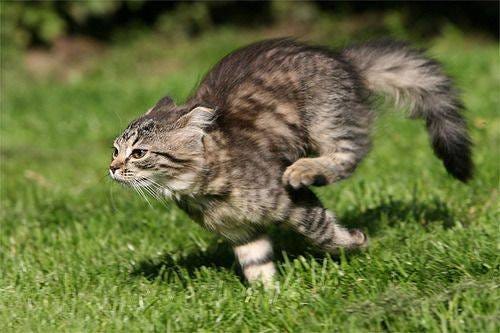Cat-killing and the Meaning of Life
TOWARDS the end of the last decade, the English imagination was running wild over media reports that somebody in the part of South London where I grew up was apparently decapitating local cats. The police, who for years had believed that he or she was responsible for upwards of 400 deaths, even released CCTV footage of people whom they suspected might be the elusive cat-murderer, although it was finally revealed that the culprit in question was actually a fox with a very large appetite.
During the course of this nationwide obsession, described by some as a 'moral panic,' a local couple had committed their lives to solving the mystery and collecting information about the possible identity of the attacker. I wonder, therefore, with the recent announcement that the killer is not human, after all, what will become of them.
Whilst it may sound as though I am becoming far too concerned about two volunteers in what was clearly a very good cause, I am thinking about the more general ramifications of those who are committed to something that eventually comes to an abrupt end. What of the man who saves his local oak tree from the axe, does he celebrate his victory over developers with a glass of champagne and then return to his mundane existence? How does the athlete who breaks every single record at the Olympics cope with the comparative banality of her next race?
As far as I'm concerned, it is a question of how we define ourselves. I wouldn't expect a man who presents himself as a painter and decorator to suffer an identity crisis if he is subsequently forced to work as a bricklayer, but there are some people who - by placing all their eggs in one basket - risk a very uncertain future. One thinks of the fragile television celebrity whose services are suddenly brought to a halt amid the changing fashions of the times. Is there really a future for the cat detective who has been rendered obsolete by the unexpected circumstances of human destiny?
From a philosophical perspective, the symbolic identification with the Ego Ideal constitutes a form of virtuality. One is not really a 'refuse collector' or a 'salesman,' otherwise one would cease to exist in the aftermath of being made unemployed, but consider for a moment what it could mean if a large number of people are identifying with more serious forms of inauthenticity. Not in terms of being part of a shoe-repairers' collective, for example, whereby members can get together at Christmas parties and swap lurid stories about the unfathomable beauty of hand-stitched leather, but on a much bigger scale. What if the very notions of 'society,' 'community' and 'nation' were completely false?
This mass separation from the authentic, or dislocation from reality, is certainly not a comforting thought. However, rather than feel threatened by the tenuous strands of modern existence we should try to reject what we are told is 'genuine' and begin searching for that which is actually palpable. Symbolic fantasies may be comforting, but they are ultimately self-limiting. As for our South London fox, I doubt that when the fuss concerning his exposure has finally died down that he will enter some kind of existential crisis. In fact he's probably far too busy thinking about his next meal.



Yes, one of the things depressed me most about my undergrad students was their focus on the need to get a job as a life project. A few clicked momentarily when I played a lecture by Alan Watts describing the futility of the normal Amnerican's trajectory through life, never getting to where they were satisfied. But what is there? Indigenous ideologies prclaim that the individual is not only part f the band, clan or tribe - but of the universe itself. Thus Jung realised one of the reasons for the extraordinary way Am Indians" all felt imoprtant when they each did something like the Navajo, who believed each person had to contribute to keeping the universe alive - can end up with Aztec sacrfices to the sun etc. but also the Hasidic idea that until each of us fulfils our unique task in the world, the messiah cannot come.